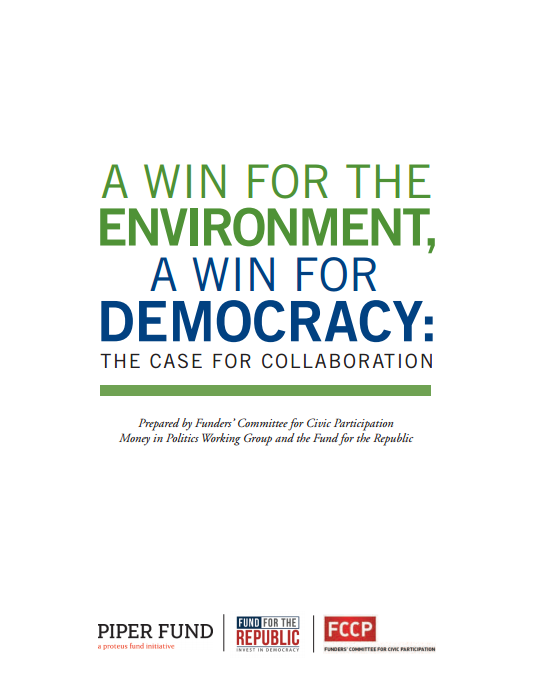This post was authored by Alexandra Russell, Director of the Money in Politics Working Group of the Funders Committee for Civic Participation.
Call me crazy, but I’m becoming slightly more optimistic about fighting back the deluge of big and corporate money flooding our democracy. My biggest source of hope comes from emerging projects within grassroots organizations and philanthropy as groups come together, connecting issue-based work to larger themes of the corporatization of democracy.
The FCCP Money in Politics Working Group has been working to broaden the money-in-politics conversation and to help others understand the relationship between the corporatization of democracy and other social justice issues. We’re seeing growing interest by funders and advocates in thinking differently about these connections.
Nowhere are those connections more clear than on environmental issues (Editor’s note: see for example Carolyn Fine Friedman’s post, “Why One Environmental Health Funder Joined a Donor Collaborative on Money in Politics”). Environmental advocates are continually outspent and outnumbered by the petrochemical industry. According to the Fund for the Republic, organizations seeking money-in-politics reforms have spent a mere $45 million, compared to $3 billion spent by lobbyists working against reform. Despite the odds, environmentalists and democracy reformers believe we have the people, public health, and justice on our side.
Seeing clear funder interest in learning more, the Money in Politics Working Group decided, together with our friends at the Fund for the Republic and the Piper Fund, to write a paper about existing partnerships and opportunities for forge new ones. A Win for the Environment, A Win for Democracy: the Case for Collaboration features new national collaborations like the Democracy Initiative, spearheaded by the Sierra Club, Greenpeace, Communications Workers of America and the National Association for the Advancement of Colored People.
It also highlights innovative grant making strategies to support this new kind of work. For example, HEFN members like the John Merck Fund, the Solidago Foundation and the Wallace Global Fund have each been using creative strategies to prioritize and fund projects that make these connections. At the Solidago Foundation, the Powering Change project links civic engagement, the emerging electorate, corporatization of our democracy together with the fight for climate justice. The John Merck Fund is supporting the Koch Out Campaign, to help New England NGOs uncover and expose the Koch’s attempts to manipulate public and environmental policy. And the Wallace Global Fund is leveraging their own grant-making resources by using their funds’ investments to support asset activism on areas like climate change.
We look forward to continuing this conversation with philanthropy and the field to explore and support next steps. Look for us at the upcoming Environmental Grantmakers Association’s fall retreat where, with the Arkay Foundation, Wallace Global Fund, Compton Foundation and the Rockefeller Brothers Fund, we will cosponsor a panel session about the Democracy Initiative and host an ad hoc breakfast conversation. In October, FCCP will participate in HEFN’s Annual Meeting which includes discussion about money in politics and funder strategies to boost the voices of people in environmental health. And in December, FCCP will keep the conversation going and celebrate its 30th anniversary at our annual winter meeting.
Until then, take a look at this report and let us know what you think!

Alexandra Russell is the director of the Money in Politics Working Group of the Funders’ Committee for Civic Participation (FCCP). Alexandra also runs the Progressive Massachusetts Funders Collaborative and is a consultant with the See Forward Fund.

